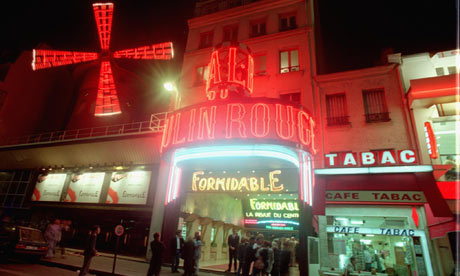
It is the city whose hedonistic nights were once the stuff of legend, where the drinks flowed freely and the music never stopped. From Jane Birkin to Josephine Baker, from the Moulin Rouge dancers to the Champs Elysées clubbers, Paris has never been one for an early night.
That is, until now. According to an array of singers, DJs, musicians and venue owners, the French capital is fast becoming a nocturnal dead-zone in which the after-hours cultural scene is being extinguished by overzealous legislation.
A petition launched last month by a collective representing the electro music industry said "urgent" steps needed to be taken to prevent Paris's music scene from "being relegated from the City of Light to the … European capital of sleep".
The appeal, which organisers hope to submit to the ministry of culture and the city hall by the end of this month, has been signed by more than 9,500 people. Comments on a complementary Facebook page denounced Paris as "the city of the dead".
"[Parisian nightlife] is on the decline in a very obvious way," said Eric Labbé, one of the petition's authors. "There seem to be more and more nights being cancelled, more sound limits being set at a very low level, and more closures."
Owners of nightclubs, concert halls and bars claim that boboisation – gentrification – of traditional party neighbourhoods has led to a gradual asphyxiation of nightlife. Residents moving into areas such as the Marais, the city's gay quarter, Bastille, a student hub, and Belleville, a working-class district in the east, are unwilling to put up with the noise, they say.
"Over the last 10 years Parisian music venues ... have taken a heavy blow due to Parisians' growing desire for ever more tranquillity," claims the petition, blaming the city's "extreme centralisation" for bringing together recreational and residential areas.
A row about noise pollution led to the six-month closure this year of one of the capital's favourite indie music venues, La Flèche d'Or. And, while it is preparing to reopen this month, the fate of another flagship of Parisian nightlife, La Locomotive, is uncertain. The Pigalle venue, which played host to the Beatles and the Rolling Stones and later became a trendy discotheque with DJs such as Laurent Garnier, is bankrupt and seeking a buyer.
Labbé said this trend of closures, lost licences and heavy fines had "accelerated" since the implementation of the smoking ban in January 2008. Since then, he said, owners had been penalised for the noise made by customers puffing outside. While he insisted he was not against the ban, he called for legislation to be altered to ease owners' predicament.
As well as changes to the law, the petition by Technopol, an electro music association, Plaqué Or, a club night organiser, and My Electro Kitchen, a record store, demands that public funding be given for high-impact soundproofing.
Policymakers, it says, must wake up to "the importance of nightlife – both culturally and economically – to the very being of a capital like Paris". If they don't, it warns, the capital will face a brain drain of creative talent. Many French musicians and DJs have already fled to more artistically friendly cities such as London, where costs are lower and legislation less restrictive.
"I haven't worked in Paris for years. And the artists from my label are leaving to go and live in Berlin or other European cultural capitals," Dan Ghenacia, a Berlin-based French DJ, told cultural magazine Les Inrockuptibles.
In the meantime, Paris city hall said it was planning to launch a website aimed at introducing tourists to some of the city's best nightspots.

